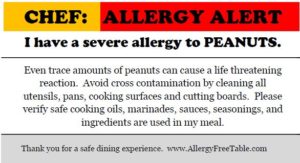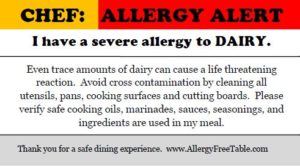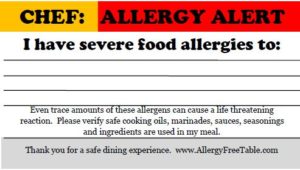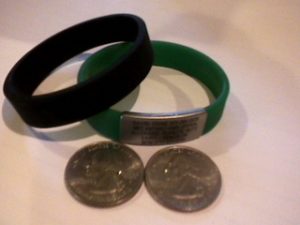Traveling with Food Allergies
Simple & Safe: 20 Tips for a fun and safe trip
- Research essentials before you go…Be sure to research the locations of hospitals, grocery stores, pharmacies, and safe restaurants on the internet. Print out copies or take good notes with addresses, telephone numbers, and directions to carry along with you on your trip.
- Research safe places to eat…Call restaurants in advance to inquire about food allergy awareness and accommodation. Go to www.allergyeats.com for restaurant reviews or download their mobile app for your smartphone. Don’t forget to bring chef cards (allergy alert cards). You can make them at home by going to our website or purchase online at other sites.



- Need a kitchen? Eating in can take some of the stress out of dealing with food allergies while on vacation. Also, the cost you save eating in a few meals, can often make up for the extra costs of staying somewhere with kitchenette. We almost always eat breakfast in, and often pack lunch. When making reservations consider home swapping, vacation condos, vacation homes, hotels with kitchenettes, or a room with a small refrigerator and microwave.
- Alert your doctor and child’s doctor…Call your child’s pediatric allergist to discuss travel plans and whether a written prescription for additional medication is necessary. Consider how far you are from emergency services when determining how much emergency medicine you need for the trip. Always have enough epinephrine to make it to local hospital.
- Plan what to pack…Make a list of clothing, medical, cell phone, car charger for cell phone, and food items to pack then check off the items as you pack them. Be sure your child has their medical alert bracelet on for the trip.
 Depending on where you travel, cell phone service is not always available, so always plan accordingly.
Depending on where you travel, cell phone service is not always available, so always plan accordingly. - Make a list of vacation activities ahead of time…Before you travel research your destination together on-line to create a family friendly list of places to see, activities, parks, festivals and interesting historical information about the area.
- Stock up on low or no cost entertainment…Visit the local library for books, CD’s, and movies that can be checked out for the duration of your trip.
- Notify loved ones…Talk with family or friends before you arrive at their home about any special dietary or other medical need beforehand.
- Take a good look at current medications…Before you leave check expiration dates and the remaining quantity on medications that will need to be taken during your trip. You may need to contact your insurance carrier to inquire about early refills.
- Alert someone close to home…Tell a friend or neighbor where you are going and exchange contact information. Offer a key to your home for emergency purposes in case you need help obtaining a forgotten item, prescription number, or other information.
- Prepare your carry-on bag carefully…Carry-on bags should include: emergency medication with the prescription label, food allergy action plan, cell phone, phone charger, list of contacts (i.e.. your doctor, your child’s doctor(s), pharmacy at your travel destination, health insurance customer service line, and next of kin), health insurance card, hand wipes, and any written prescriptions.
- Consider food options during travel…Bring safe food with you to eat during air, train, and bus travel. Food can be packed from home or purchased at the terminal before boarding. (Never assume there will be safe food available for purchase.) When making a reservation for travel ask the carrier about their specific allergy policy since the policies vary. Communicate your needs and arrangements again with staff when you arrive at the train station, airport gate, or bus depot and when boarding.

Tip: Frozen packs must be in a frozen state before allowed onboard an airplane. Keep medicine separate when passing through airport security, and make security personnel aware of it before putting through x-ray machine. - Be prepared to clean before using public transportation and bathrooms…Bring wipes whenever you travel to wipe down handles, tray tables, and arm rests. Don’t forget to wipe the bathroom handle and faucet before using the facilities.
- Plan essentials for day trips…Wherever you travel pack a small collapsible cooler to use for day trips.
- Staying at a hotel? Contact the concierge and housekeeping in advance to discuss food allergies and other medical conditions that require special accommodations.
Ask questions such as;
Where are the nearest -hospitals, urgent care, restaurants, pharmacy, and grocery stores?
What is the travel time to the hospital?
What cleaning products are used when laundering linens and cleaning the room? - Going on a road trip? Your essentials should include an accessible bag with the carry-on items listed in #11, cloth reusable grocery bags filled with safe dry food, a cooler filled with safe foods, utensils, storage containers, napkins, paper plates and bowls, and towels for clean-up. Once you arrive at your destination focus on the fun not the food to distract from possible disappointment in food options. If you bring extra epinephrine, be sure not to leave in a hot or cold car; either extreme temperature can cause a problem in effectiveness.
- Don’t forget the ice…When traveling with a cooler make sure to replace the ice daily to prevent spoilage.
- Create memories through photography…Taking pictures is a low cost meaningful memory keepsake for years to come. Renting a vehicle? Take a photo of any damage to the vehicle before driving away from the rental facility. Found an awesome restaurant? Take a photo and send it to other families who manage food allergies and may travel to the same location.
- Write down your experiences…document your trip by writing down favorite activities, prices, safe places to eat or stay, new contact information, and the ease or difficulty of staying at that location. You or someone you know may need this information when planning future trips.
- Share your experiences…Families who manage food allergies and other food related disease require support. Take time to reach out to others in the community to share your travel experiences and tips for a food allergy safe vacation.
More Resources:
- Do you need a refresher on eating out with food allergies?
Check out our short free course on Tips for Dining Out Safely - Not sure about the FDA label requirements for allergens and what foods and drinks are regulated by FDA?
Check out our short, free course on Food Allergies and How to Read a Label - Online Restaurant Reviews: AllergyEats and AllerDine
- Disney Information: Allergy Free Mouse
- Language Translation Food Allergy Cards: SelectWisely
